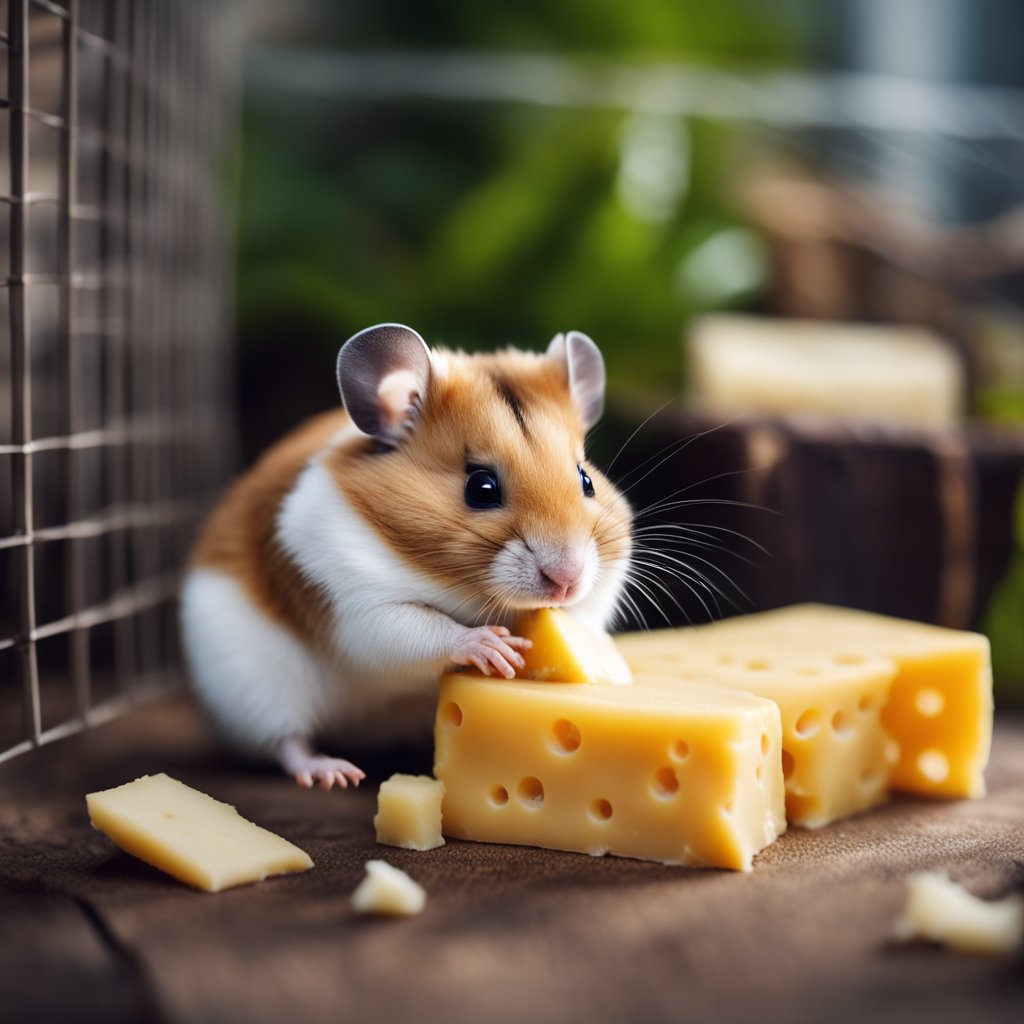Do Hamsters Eat Cheese? A Comprehensive Guide to Hamster Diets
If you’re a hamster owner, you may be wondering if cheese is a safe and healthy food for your furry friend. While hamsters are omnivores and can eat a variety of foods, not all human foods are safe for them. Cheese is a popular human food, but can hamsters eat cheese? In this article, we’ll explore the topic of hamsters and cheese, and provide you with accurate information to help you make informed decisions about your hamster’s diet.
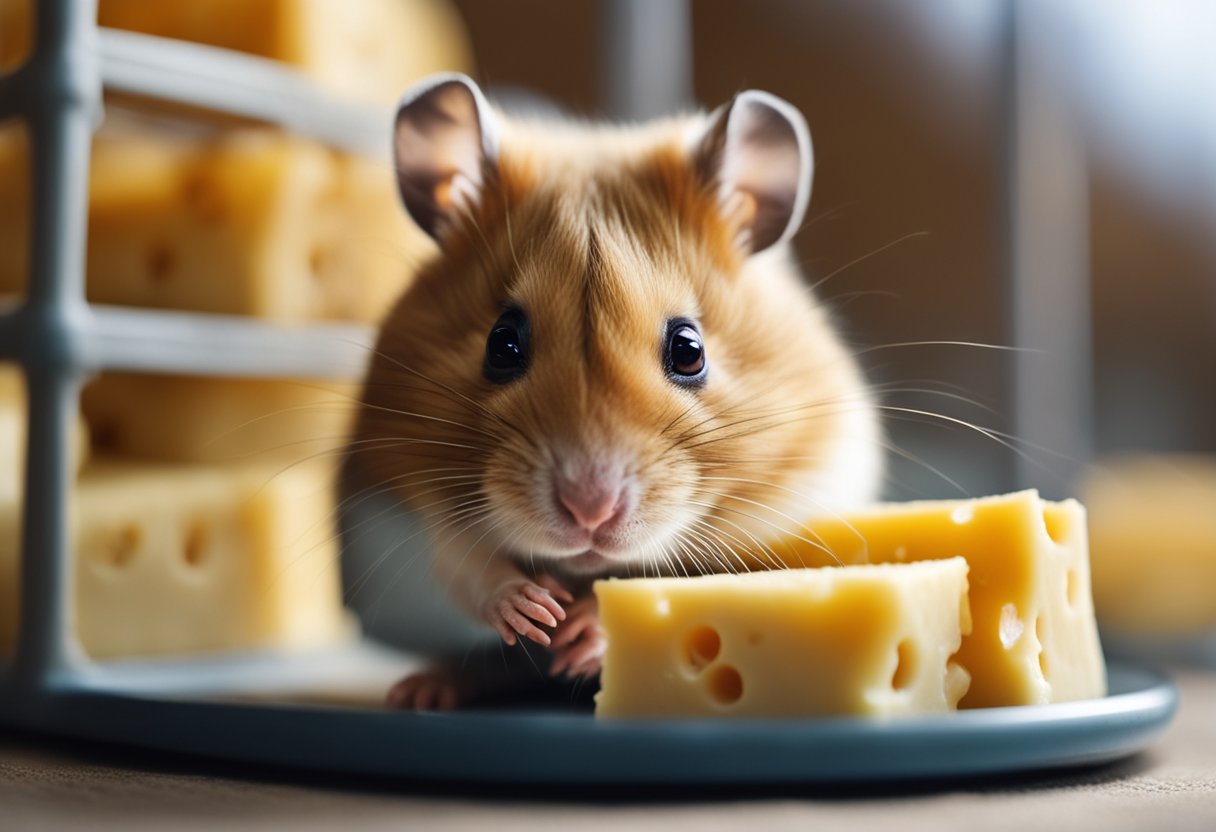
Before we dive into the topic of cheese and hamsters, let’s review some basics of hamster dietary needs. Hamsters are omnivores, which means they eat both plants and animals. In the wild, hamsters eat a variety of foods such as seeds, grains, grasses, and insects. As pets, hamsters should have a diet that is high in fiber and protein, but low in fat and sugar. It’s important to provide your hamster with a complete and balanced commercial diet, as well as fresh fruits and vegetables in moderation.
Now that we’ve covered the basics of hamster dietary needs, let’s explore the topic of cheese and hamsters. While cheese can be safe for hamsters in small quantities, it is not an essential part of their diet. Some types of cheese are better than others for hamsters, and it’s important to choose low-fat and low-salt options. In the next section, we’ll dive deeper into the topic of cheese and hamsters and provide you with more detailed information.
Key Takeaways
- Hamsters are omnivores and need a diet that is high in fiber and protein, but low in fat and sugar.
- Cheese can be safe for hamsters in small quantities, but it is not an essential part of their diet.
- When feeding cheese to your hamster, it’s important to choose low-fat and low-salt options.
Hamster Dietary Basics
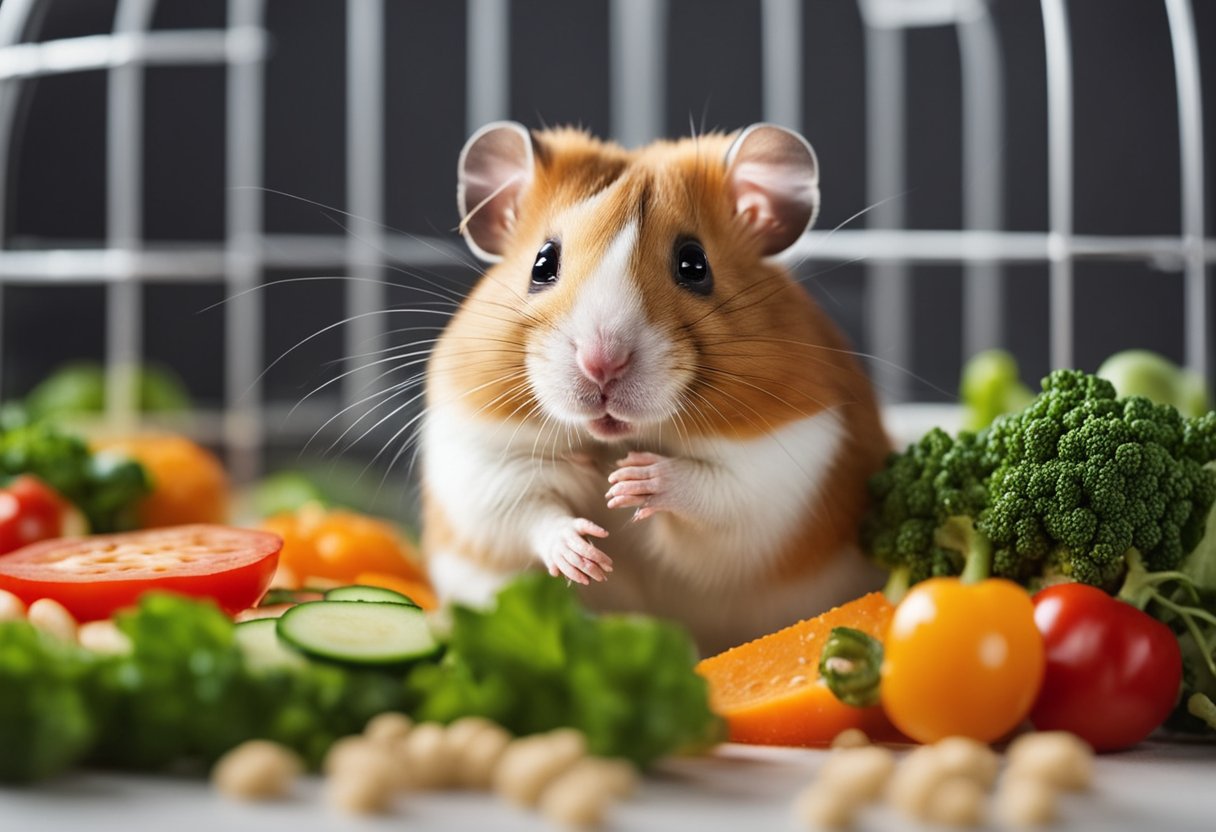
As a responsible hamster owner, it is important to understand the nutritional needs of your furry friend. Hamsters are omnivores and require a balanced diet to maintain good health. In this section, we will discuss the nutritional needs of hamsters and the safe foods that you can include in their diet.
Nutritional Needs
Hamsters require a diet that is high in protein, fiber, and low in fat. They also need a good amount of vitamins and minerals to keep their bodies healthy. A balanced diet for a hamster should consist of:
- High-quality hamster food: This food contains a balanced mix of grains, seeds, and other essential nutrients.
- Fresh fruits and vegetables: These provide important vitamins and minerals that hamsters need to maintain good health.
- Protein: Hamsters need protein to build and repair muscles. Protein sources can include cooked meats, boiled eggs, and insects.
It is important to note that hamsters have sensitive digestive systems and should not be fed foods that are high in fat, sugar, or salt. These types of foods can cause health problems such as obesity, diabetes, and heart disease.
Safe Foods for Hamsters
Hamsters can eat a variety of foods, but not all foods are safe for them to consume. Some safe foods that you can include in your hamster’s diet are:
- Fresh vegetables: Carrots, broccoli, kale, and spinach are all good options.
- Fresh fruits: Apples, bananas, and strawberries are all safe for hamsters to eat in moderation.
- Seeds and nuts: Sunflower seeds, pumpkin seeds, and almonds are all good sources of protein and healthy fats.
It is important to note that some foods, such as chocolate, caffeine, and avocado, are toxic to hamsters and should never be fed to them.
When it comes to cheese, hamsters can eat it in small quantities. Hard and soft cheeses can be eaten by hamsters, but they need to be low in fat and salt. Mild cheddar, pasteurized goat cheese, and cottage cheese, which is low in fat and high in protein, are good options. However, some cheeses should never be fed to your hamster. Always consult with a veterinarian before introducing new foods to your hamster’s diet.
By providing your hamster with a balanced diet that meets their nutritional needs, you can help ensure that they live a long and healthy life.
Cheese and Hamsters
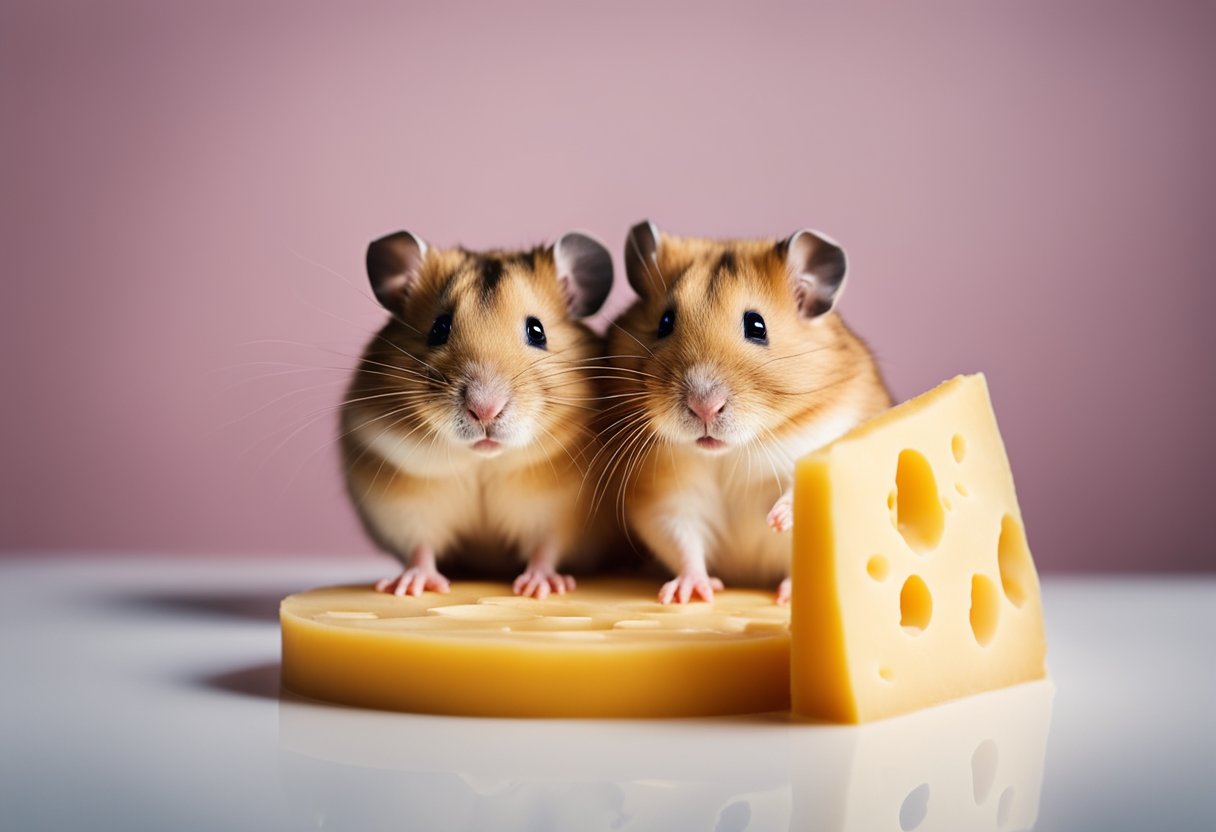
If you are a hamster owner, you may be wondering whether you can feed cheese to your furry friend. While hamsters are omnivores and can eat a variety of foods, including fruits, vegetables, and grains, cheese is not a natural part of their diet. Here are some things to consider before feeding cheese to your hamster.
Lactose Tolerance in Hamsters
Like many other animals, hamsters are lactose intolerant. This means that they cannot digest lactose, the sugar found in milk and dairy products, properly. Feeding cheese to your hamster can cause digestive issues such as diarrhea, bloating, and stomach pain. Therefore, it is important to feed cheese to your hamster in moderation, if at all.
Types of Cheese for Hamsters
If you decide to feed cheese to your hamster, it is important to choose the right type of cheese. Hard and soft cheeses can be eaten by hamsters, but they need to be low in fat and salt. Mild cheddar, pasteurized goat cheese, and particularly cottage cheese, which is low in fat and high in protein, are good options. However, some cheeses should never be fed to hamsters, such as blue cheese, which can be toxic to them.
Risks of Feeding Cheese to Hamsters
Feeding cheese to your hamster can pose some risks. Cheese is calorie-dense and high in fat, and since hamsters are prone to both obesity and diabetes, they should not be fed cheese regularly. In addition, feeding cheese to your hamster can increase the risk of dental issues, as cheese can stick to their teeth and cause plaque buildup.
Feeding Cheese to Hamsters Safely
If you decide to feed cheese to your hamster, it is important to do so safely. Feed cheese to your hamster in small quantities, and only as an occasional treat. Make sure to choose the right type of cheese, and avoid feeding them cheese that is high in fat or salt. It is also important to monitor your hamster for any signs of digestive issues after feeding them cheese.
In conclusion, hamsters can eat cheese, but it should only be fed to them in moderation and with caution. If you are unsure about whether or not to feed cheese to your hamster, consult with a veterinarian who can provide you with more information on the nutritional needs of your furry friend.
Resources
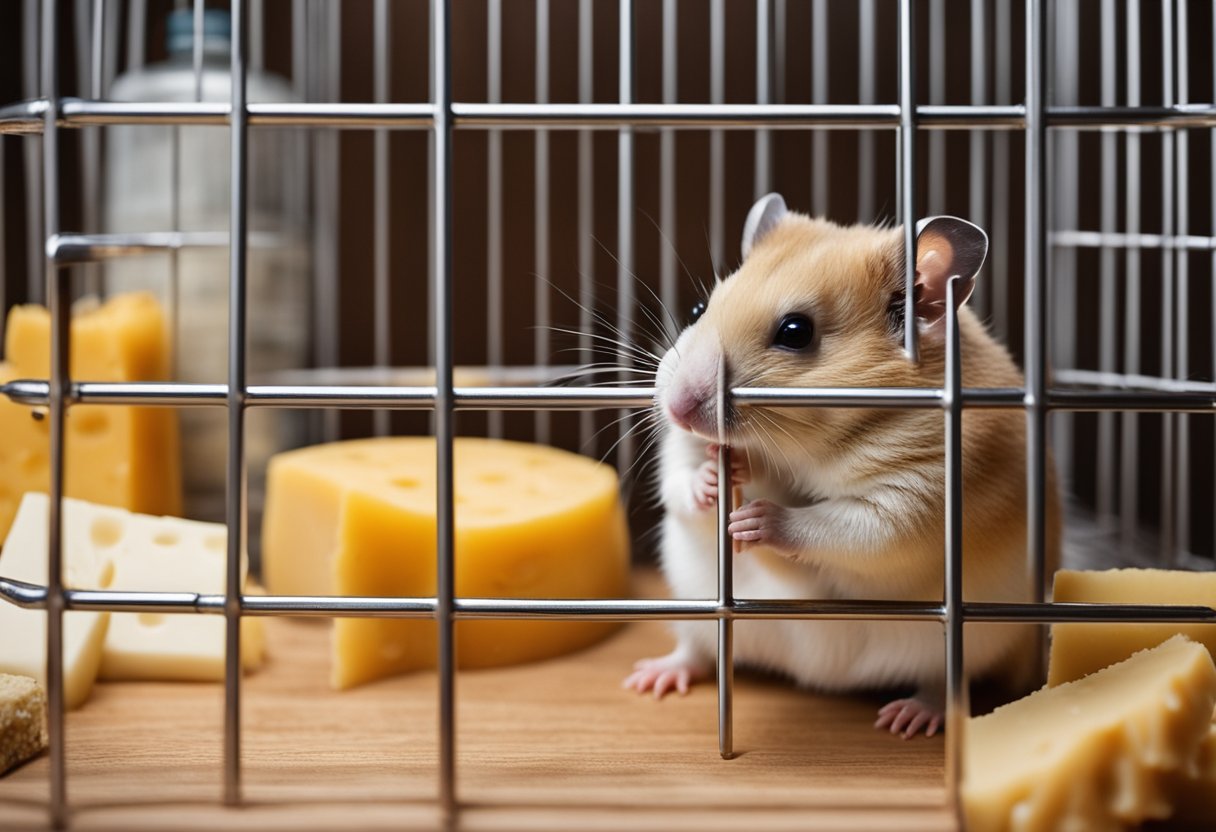
If you’re considering feeding your hamster cheese, it’s important to research the topic thoroughly to ensure that you’re providing your pet with a healthy and balanced diet. Here are some resources to help you learn more about hamster nutrition and the role that cheese can play in their diet:
- The Spruce Pets provides an overview of whether hamsters can eat cheese and what types of cheese are safe for them to consume. They recommend feeding cheese to your hamster in small quantities and as an occasional treat rather than a regular part of their diet.
- Hepper offers a vet-reviewed guide to hamster nutrition, including information on the types of cheese that are safe for hamsters to eat. They caution that cheese should be low in fat and salt and recommend mild cheddar, pasteurized goat cheese, and cottage cheese as good options.
- Vet Explains Pets provides advice on hamster nutrition and diet, including the role that cheese can play in their diet. They recommend that hamsters eat a diet that is low in fats and sugars and that includes high-quality hamster food and Timothy hay.
When researching hamster nutrition and the role that cheese can play in their diet, it’s important to consult a variety of sources to ensure that you’re getting accurate and up-to-date information. By using the resources listed above, you can make informed decisions about what to feed your pet hamster and help ensure that they stay healthy and happy.
Conclusion
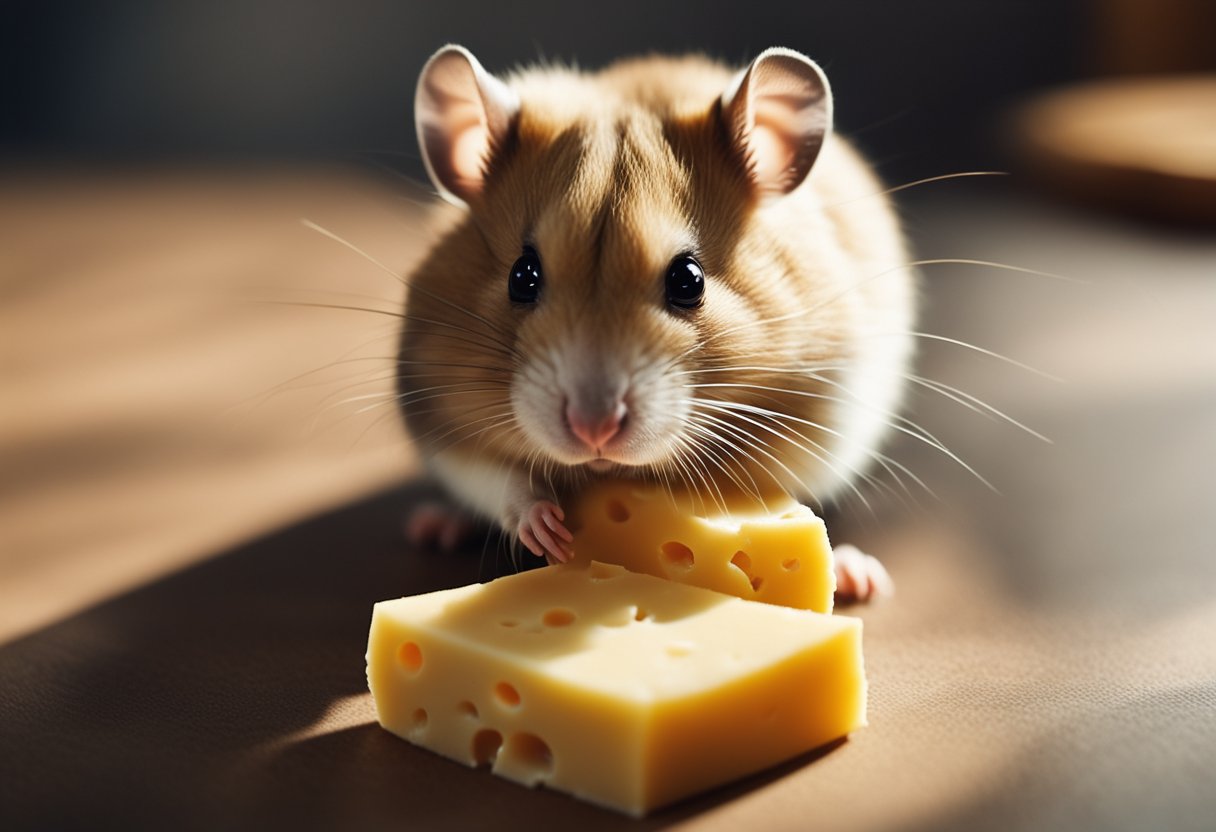
In summary, hamsters can eat cheese, but it should only be given to them in moderation. Cheese should not be a large part of their diet and should not be given more than once a week.
When selecting a type of cheese, opt for low-fat and low-salt varieties such as cottage cheese, mild cheddar, or pasteurized goat cheese. Avoid cheeses that are dangerous for hamsters, such as Stilton and blue cheese, to keep your pet safe.
Hamsters are omnivores that can enjoy a variety of foods. In the wild, hamsters tend to eat seeds, grain, grasses, and occasionally insects. Fortunately, complete and balanced commercial diets are available to ensure pet hamsters get everything they need to stay healthy.
Remember that cheese is a good source of calcium and protein, but it is also high in fat and can lead to health problems if consumed in large amounts. As a responsible pet owner, it’s essential to provide your hamster with a balanced diet that includes a variety of foods and treats.
By following these guidelines, you can safely give your hamster a small amount of cheese as a tasty treat from time to time.
Frequently Asked Questions
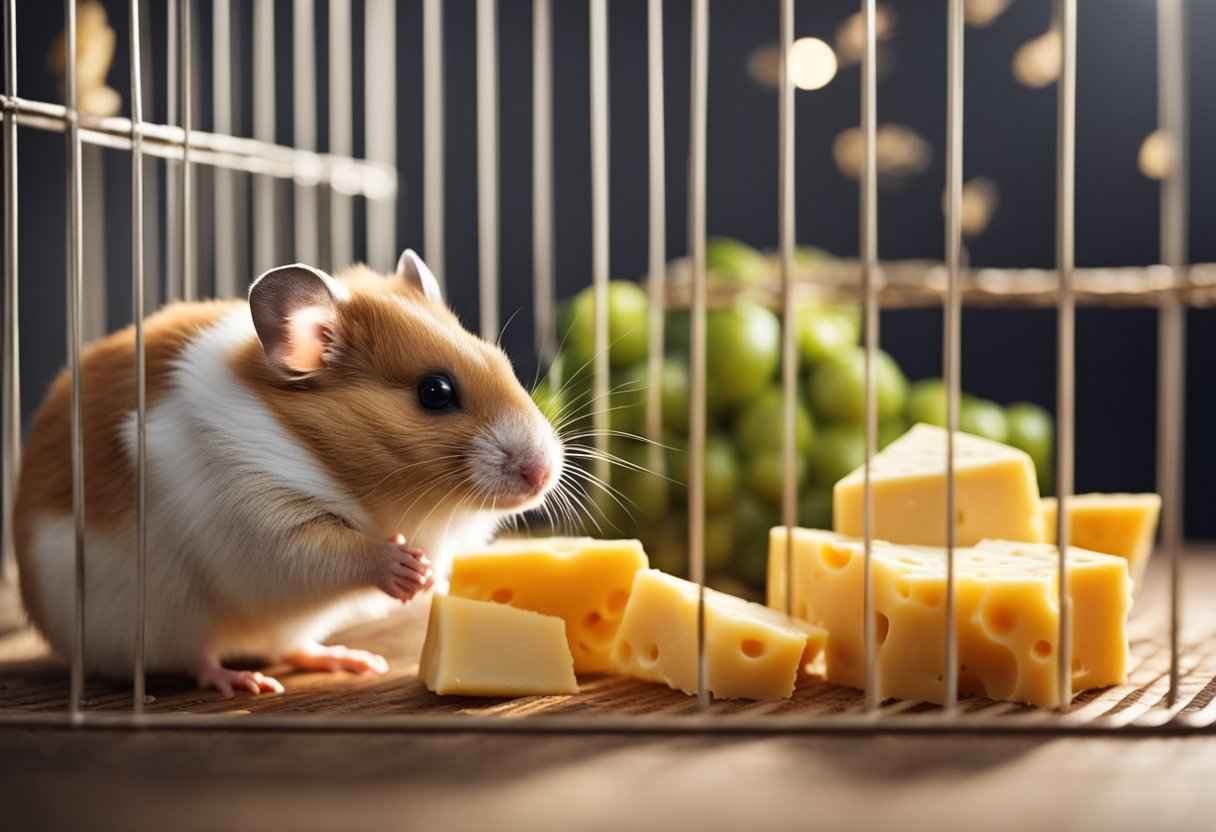
What types of cheese are safe for hamsters to consume?
Hamsters can eat most types of cheese, but some are better than others. Soft cheeses like brie and camembert are high in fat and should be avoided. Hard cheeses like cheddar and parmesan are lower in fat and are a better choice. Mild cheddar, pasteurized goat cheese, and particularly cottage cheese, which is low in fat and high in protein, are good options. However, some cheeses should never be given to hamsters, such as blue cheese, which contains mold that can be harmful to their health.
Are dairy products in general safe for hamster diets?
Dairy products should not be a significant part of a hamster’s diet. While hamsters can consume small amounts of cheese as a treat, they cannot digest lactose, a sugar found in dairy products, which can cause digestive problems. It’s best to stick to a balanced diet that includes commercial hamster food, fresh vegetables, and fruits.
What are the health risks of feeding cheese to hamsters?
Feeding cheese to hamsters in large amounts can lead to obesity, diarrhea, and other digestive problems. Cheese is high in fat and salt, which can be harmful to their health. It’s essential to give cheese to hamsters only in small amounts as a treat to avoid any health risks.
What should a balanced diet for a hamster include?
A balanced diet for a hamster should include commercial hamster food, fresh vegetables, and fruits. The commercial food should be the primary source of nutrition and should make up the majority of their diet. Fresh vegetables and fruits should be given as a supplement to provide additional nutrients and variety.
Which human foods are harmful to hamsters?
Some human foods can be harmful to hamsters and should be avoided. Foods that are high in fat, salt, and sugar, such as chocolate, candy, and potato chips, can be harmful to their health. Foods that are toxic to humans, such as garlic and onions, can also be toxic to hamsters.
What are some favorite treats that are safe for hamsters?
Hamsters enjoy a variety of treats, including fresh fruits and vegetables, seeds, and nuts. Some safe options include apples, bananas, blueberries, carrots, and cucumbers. It’s essential to introduce new treats gradually and in small amounts to avoid any digestive problems.
